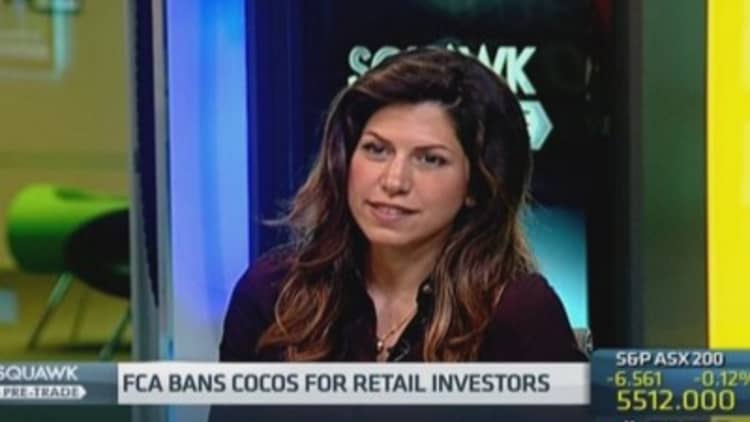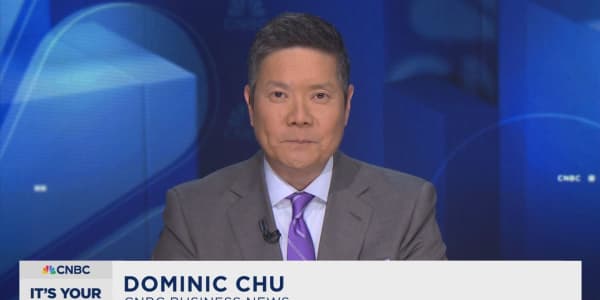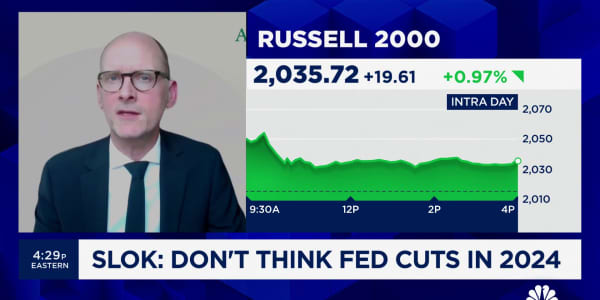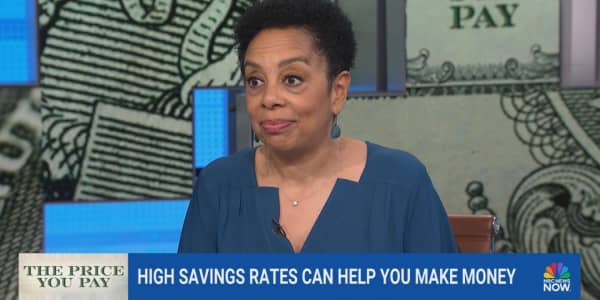This year is already proving a record one for contingent convertible—or "CoCos"—bonds as banks seek to boost their capital buffers, according to data provided for CNBC by financial software company, Dealogic.
So far this year, issuers have launched 102 CoCo bonds—which differ from regular convertible bonds in that they only convert to equity once a specified event has occurred, such as a share price hitting a certain level—up from 68 by the same point in 2014 and only one by the same point in each of 2010 and 2011.
Global contingent capital volumes year-to-date—Dealogic:
These securities have emerged as a popular way for banks, particularly in Europe, to raise their core "Tier 1" capital—a lender's first line of defense against financial shocks—to meet the more stringent capital requirements introduced after the global financial crisis of 2007-08. Banks are now required to hold 4.5 percent of "Common Equity Tier 1" of risk-weighted assets and 1.5 percent of "Additional Tier 1" (AT1) assets, in line with the provisions of the international Basel III financial agreement.
Strong issuance has been met with demand, with ultra-low interest rates from the major global central banks fueling a hunt for yield.
Returns on CooCo bonds from developed market issuers have largely trumped those on bank debt in the last few months, according to financial services company, Markit.
Both the Markit iBoxx USD Contingent Convertible Developed Market and iBoxx EUR Contingent Convertible Developed Market indices have returned more than 5 percent since the start of the year. Markit also noted that premiums required by investors to hold CoCos over subordinated debt had been falling and that issuance was seen accelerating further into the final quarter of 2015.
However, analysts remain cautious about what remains a relatively unknown and untested instrument and regulators in countries like the U.K. have banned retail buyers from investing.
In June, the U.K.'s Financial Conduct Authority said CoCos were "generally not suited to the needs of ordinary investors," as it made permanent its ban on their sale to retail buyers:
"While CoCos can be designed in a range of different ways, all are highly complex instruments presenting investment risks that are exceptionally challenging to evaluate, model and price… We are concerned that ordinary retail investors are likely to be attracted to these securities and overlook or misunderstand their characteristics and risks," the body said in a report detailing its decision.

Some features of the securities may worry institutional investors as well, including uncertainty as to whether they could upend the traditional pecking order of equity and bond capital holders in the event of issuer bankruptcy.
"The game is still new and the form of its players becoming evident. There is no clear standardization or uniformity among AT1 securities and fundamental analysis of bank assets… will continue to be key as investors size up the idiosyncratic risks," said Hermes Investment Management in a research note earlier this year.
Nonetheless, an increasing number of issuers are eager to enter the game. Although CoCos have largely been the preserve of large "bulge bracket" banks thus far, that looks set to change with a number of smaller lenders entering the fray in Europe.
The U.K.'s state-backed Royal Bank of Scotland bolstered its core Tier 1 ratio in August after issuing two CoCos worth $3.1 billion. And in the same month, France's BNP Paribas launched a $1.5 billion AT1 contingent capital bond. This followed a deal from Rabobank—the first Dutch issuer of AT1 instruments—and Ireland's entry to the fray with deals from Bank of Ireland and Permanent TSB.
In addition, non-bank players may become more regular fixtures in the market. Moody's Investors Service said in July that insurance companies might launch more contingent capital bonds as evolving regulation in Europe, China and Australia, in particular, would allow them to classify these securities as regulatory-efficient capital.
"Many insurers globally are examining CoCo issuance, given low interest rates, successful issuance from banks and evolving regulatory capital requirements," said Simon Harris, a Moody's managing director, in a research note.
The biggest fans of CoCos at the moment however appear to be Chinese banks, which are responsible for eight of this year's 10 biggest deals so far, according to Dealogic.
The Agricultural Bank of China's $6.5 billion preferred share issue in March is this year's biggest deal, followed by a $4.7 billion investment grade bond from Shanghai Pudong Development Bank, according to Dealogic. The two non-Chinese top 10 deals came from European banks, namely UBS and HSBC Holdings—the latter of which has strong ties to China-Hong Kong.
This year's top 10 CoCo deals—Dealogic:
—By CNBC's Katy Barnato. Follow her on Twitter @KatyBarnato.









